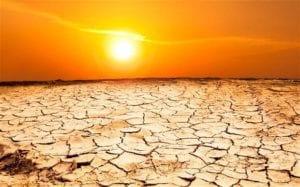Many regions of the world may see unprecedented drought due to climate change before the year 2050.
This is according to new research, from the International Institute for Applied Systems Analysis (IIASA), presented earlier this week at the European Geophysical Union conference in Vienna, Austria. In the new study, IIASA researcher Yusuke Satoh projected for 26 world regions the point at which drought severity would become unprecedented in the historical record—a new measure proposed in this study as Timing of Perception Change for Drought (TPCD). “Our study shows an increasing urgency for water management systems to adapt to future drought,” says Satoh. “In order for policymakers to plan for adaptation, they need to know when and where this is likely to happen, and have an understanding of the levels of uncertainty in such projections.”Climate scenarios
The new study combines five different global climate models and examines two different scenarios for future climate change, from the Representative Concentration Pathways (RCPs), which were developed for the most recent report of the Intergovernmental Panel on Climate Change (IPCC).It shows that for RCP8.5, which represents the highest levels of greenhouse gas emissions and resulting climate change, 13 of 26 global regions would see unprecedented hydrological drought levels by 2050.








